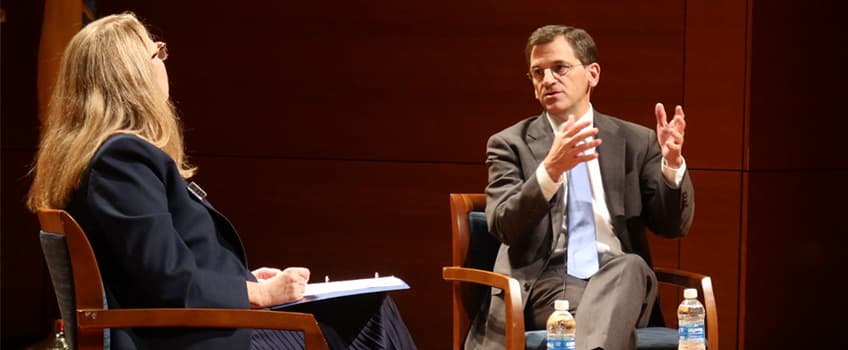N.Y. Times Journalist Peter Baker Talks Presidential Politics

New York Times Chief White House Correspondent Peter Baker, right, talks with Stockton Communications Studies professor Toby Rosenthal on Sept. 12 in the Campus Center Theatre.
Galloway, N.J. — As the New York Times chief White House correspondent, journalist Peter Baker has written numerous stories and books about the past five United States presidents.
But one thing he hasn’t done over that time is vote for one.
“For me, I’ve always found that not voting makes it that much easier to keep my head separate from any personal judgment,” said Baker during a talk Sept. 12 before a packed audience at Stockton University’s Campus Center Theatre. “I just find it’s easier for me to try and stay as neutral and independent as uninvolved as possible.”
Baker, 57, sat down with Stockton Communications Studies professor Toby Rosenthal to discuss his career, his insights into covering politics and the presidency, the upcoming presidential election and how the media landscape has changed during his career. The conversation was sponsored by the William J. Hughes Center for Public Policy at Stockton.
“The mission of the public policy center is to facilitate conversations about important policy issues, educate the public and encourage civic engagement,” said Hughes Research Associate Alyssa Maurice in introducing Baker. “Journalists play a crucial role in that effort to foster a more informed and engaged electorate, and we are very fortunate to have one of the best here with us tonight.”
Baker joined the New York Times in 2008 after two decades at the Washington Post. In addition to covering the White House, he has also covered eight Supreme Court nominations, six presidential inaugurations, three impeachments and multiple State of the Union addresses. He said covering the White House is the best beat because any issue of importance at some point comes across the president’s desk.
“The great thing about reporting is that there’s no such thing as a typical day. You get to write about climate change and race relations and missile defense and foreign policy,” he said. “You get to learn about all that and try and explain it.”
It’s your job to find out what they’re doing, to find out why they’re doing it and to both explain and reveal. The principles of journalism, which is independent, fact-driven, context-driven and fairness-driven, don’t change on who the president is.”Peter Baker, Chief White House correspondent for the New York Times
“When I started at the Washington Post, I wrote one story a day by around 6 p.m. and that was the sum total of my expected output,” he said.
Now he might be expected in a day to post news on social media, provide updates to the New York Times’ daily live blog, appear on a podcast or on television, and maybe even write a story that appears in the newspaper’s printed edition.
“The acceleration of the news cycle is so intense that the danger for journalism is that we pump out all this stuff without taking the time to stop, take a breath and say, ‘Wait, what did it all mean?’” Baker said. “I’m a believer in getting it right before you get it first. But there’s a lot of pressure to get it first right now. I think that speed kills and you’ve got to be careful in journalism.”
And that’s why explaining the news in a fair and fact-driven context has become more important than ever, especially as the media’s credibility is being questioned by the public.
“Unfortunately, trust in media is at a low level, and that’s a crisis for us. It is up to us to make ourselves essential by providing information nobody else is providing and by doing the kind of writing that nobody else can do,” he said. “We should write truth and the facts as we see it, not what we think our readers want us to say.”
And Baker emphasized that he has always approached his job the same, regardless of whether the president is a Democrat or a Republican.
“It’s your job to find out what they’re doing, to find out why they’re doing it and to both explain and reveal,” he said. “The principles of journalism, which is independent, fact-driven, context-driven and fairness-driven, don’t change on who the president is.”
Baker said his job is even more important as the country heads toward a contentious presidential election in November.
“It is up to us as readers and voters to educate ourselves through trustworthy sources about the candidates that we are thinking about voting for,” he said.
But there’s no place he would rather be than in a newsroom on Election Day.
“It is so fun. The elections results come in from people all over the country. You are watching history being made,” Baker said. “Whoever wins, whoever you are for, whoever you are against, it is just an extraordinary experience. It is democracy in action. I know it sounds hokey, but my goodness, we ought to be glad that we have them.”
— Story by Mark Melhorn, photos by Lizzie Nealis
More stories about the William J. Hughes Center for Public Policy
-
Stockton Poll: Two-thirds of N.J. Voters Say Tariffs Led to Higher Prices
Wednesday, February 25th, 2026 -
Stockton Poll: Two-thirds of N.J. Voters Think Immigration Enforcement Gone Too Far
Thursday, February 19th, 2026 -
Hughes Center Honors Five, Including One of its Founders
Monday, November 17th, 2025 -
Stockton Poll: Most NJ Voters Think Country Headed in Wrong Direction
Friday, October 3rd, 2025




